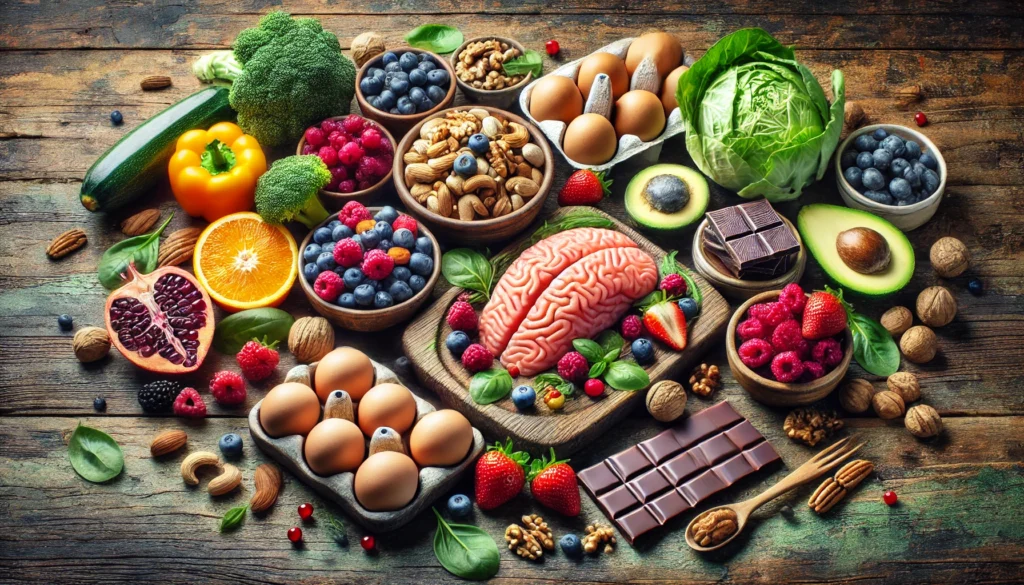Introduction: The Link Between Nutrition and Mental Health
The relationship between diet and mental health is a topic of increasing interest among researchers, healthcare professionals, and individuals seeking to improve cognitive function and emotional well-being. The foods we eat play a critical role in the functioning of the brain, influencing neurotransmitter activity, neuroplasticity, and even the risk of developing mental health disorders. Understanding the impact of diet on mental health is essential for making informed choices that can lead to enhanced mood, improved concentration, and a lower likelihood of conditions such as depression and anxiety.
Modern dietary patterns have shifted significantly over the last few decades, with increased consumption of processed foods, artificial additives, and refined sugars. These dietary changes have been linked to a rise in mental health issues, including cognitive decline and mood disorders. Conversely, nutrient-dense foods provide essential vitamins, minerals, and antioxidants that support brain function and promote mental well-being. By exploring the best foods for mental health, individuals can optimize their diets to foster long-term cognitive enhancement and emotional stability.
The field of nutritional psychiatry has gained traction, providing evidence-based insights into how food choices affect mental health outcomes. Research suggests that specific nutrients, such as omega-3 fatty acids, B vitamins, antioxidants, and amino acids, play a crucial role in supporting brain health. This article explores the best foods to eat for mental health, examining their benefits and offering practical recommendations for integrating them into a balanced diet.
You may also like: Best Brain Foods for Focus, Memory, and Longevity: What Science Says
The Science Behind Food and Brain Health
Understanding the biochemical mechanisms that connect food and brain function is key to appreciating the significance of dietary choices. The brain is a metabolically active organ that requires a constant supply of energy and nutrients to function optimally. Neurons rely on specific nutrients to generate neurotransmitters, maintain cellular integrity, and prevent oxidative stress. A deficiency in essential nutrients can lead to cognitive impairment, mood disturbances, and an increased risk of neurodegenerative diseases.
The gut-brain axis is another fundamental concept in nutritional psychiatry. The gut microbiome, which consists of trillions of bacteria, has a direct impact on brain function through its influence on neurotransmitter production, inflammation, and immune system regulation. Diet plays a significant role in shaping the gut microbiome, with fiber-rich and probiotic foods promoting a healthy gut environment that supports mental well-being. By consuming foods that help mental health, individuals can harness the power of nutrition to enhance cognitive function and emotional resilience.

Omega-3 Fatty Acids: Essential Fats for Brain Health
Omega-3 fatty acids are among the most well-researched nutrients for brain health. These essential fatty acids, particularly eicosapentaenoic acid (EPA) and docosahexaenoic acid (DHA), are critical components of neuronal membranes and play a role in synaptic plasticity, neurotransmitter function, and inflammation regulation. A deficiency in omega-3s has been linked to increased risks of depression, anxiety, and cognitive decline.
Fatty fish such as salmon, mackerel, sardines, and trout are among the best sources of omega-3 fatty acids. Regular consumption of these fish has been associated with improved cognitive performance and a lower incidence of mood disorders. For individuals who do not consume fish, alternative sources of omega-3s include flaxseeds, chia seeds, walnuts, and algae-based supplements. Incorporating these foods into the diet can provide significant benefits for mental health and cognitive function.
Studies suggest that omega-3 fatty acids influence serotonin and dopamine levels, two neurotransmitters closely associated with mood regulation. Higher levels of these neurotransmitters contribute to reduced symptoms of depression and anxiety. Furthermore, omega-3s have anti-inflammatory properties that help protect the brain from oxidative stress and neurodegeneration. By including omega-3-rich foods in the diet, individuals can support long-term brain health and emotional stability.
Antioxidants: Protecting the Brain from Oxidative Stress
Oxidative stress is a major contributor to cognitive decline and mental health disorders. Free radicals, which are unstable molecules produced by metabolic processes and environmental factors, can damage brain cells and impair cognitive function. Antioxidants play a crucial role in neutralizing these free radicals, reducing inflammation, and protecting neuronal integrity.
Berries, such as blueberries, strawberries, and blackberries, are rich in antioxidants known as flavonoids. These compounds have been shown to enhance memory, improve cognitive function, and reduce the risk of neurodegenerative diseases. Dark chocolate, which contains high levels of flavonoids, has also been linked to improved mood and cognitive performance. The polyphenols in dark chocolate stimulate blood flow to the brain, supporting optimal neuronal activity.
Leafy greens, including spinach, kale, and Swiss chard, are packed with vitamins C and E, which have neuroprotective properties. Vitamin C plays a role in dopamine synthesis, while vitamin E helps reduce oxidative stress and inflammation in the brain. Regular consumption of antioxidant-rich foods can contribute to long-term cognitive health and emotional well-being.

B Vitamins: Vital Nutrients for Neurotransmitter Function
B vitamins, particularly B6, B9 (folate), and B12, are essential for brain health and neurotransmitter synthesis. These vitamins play a role in the production of serotonin, dopamine, and norepinephrine, which regulate mood, motivation, and stress response. A deficiency in B vitamins has been linked to increased risks of depression, anxiety, and cognitive decline.
Whole grains, legumes, and leafy greens are excellent sources of folate, which is crucial for DNA synthesis and neurotransmitter function. Animal products, such as eggs, dairy, and lean meats, provide vitamin B12, which is essential for myelin formation and nerve function. Individuals following a vegetarian or vegan diet may need to supplement with B12 to prevent deficiencies that could negatively impact mental health.
B vitamins also play a role in homocysteine metabolism. High levels of homocysteine have been associated with an increased risk of cognitive impairment and mental health disorders. By ensuring adequate intake of B vitamins, individuals can support brain function and reduce the likelihood of mood disturbances.
Complex Carbohydrates: Sustaining Energy and Mood
The brain relies on a steady supply of glucose to function efficiently. Complex carbohydrates provide a slow and steady release of glucose, preventing fluctuations in blood sugar levels that can lead to mood swings and cognitive fatigue. Unlike refined sugars, which cause rapid spikes and crashes in blood sugar, complex carbohydrates support sustained energy and mental clarity.
Whole grains, such as quinoa, brown rice, and oats, are excellent sources of complex carbohydrates that provide fiber, vitamins, and minerals. Legumes, including lentils and chickpeas, offer additional benefits by supplying protein and micronutrients that support neurotransmitter synthesis. By incorporating these nutrient-dense carbohydrates into the diet, individuals can maintain stable energy levels and enhance cognitive function.
Consuming foods with a low glycemic index can further support mental health by reducing inflammation and improving insulin sensitivity. A diet rich in whole, unprocessed foods provides essential nutrients that promote long-term cognitive health and emotional well-being.
Frequently Asked Questions (FAQ) on the Best Foods for Mental Health
1. How do the best foods for mental health improve brain function?
The best foods for mental health provide essential nutrients that support neurotransmitter production, neuronal repair, and inflammation reduction. Omega-3 fatty acids, for instance, enhance synaptic plasticity, allowing brain cells to communicate more efficiently. Additionally, antioxidants found in berries and dark chocolate help neutralize oxidative stress, which can damage brain cells over time. B vitamins, present in whole grains and leafy greens, are crucial for neurotransmitter synthesis, ensuring balanced dopamine and serotonin levels for stable mood and cognitive clarity. Regularly consuming these foods contributes to long-term cognitive health and reduces the risk of mental health disorders like depression and anxiety.
2. What are the best foods to eat for mental health when managing stress and anxiety?
Managing stress and anxiety through diet involves consuming nutrient-dense foods that regulate cortisol levels and promote relaxation. Fatty fish rich in omega-3s help mitigate the effects of chronic stress by lowering inflammation and stabilizing brain function. Magnesium-rich foods such as spinach, almonds, and avocados contribute to muscle relaxation and support the nervous system in combating stress. Fermented foods like yogurt and kimchi enhance gut health, which is directly linked to mood regulation through the gut-brain axis. Additionally, complex carbohydrates, such as quinoa and oats, maintain steady blood sugar levels, preventing energy crashes that can exacerbate stress. Incorporating these foods consistently can foster resilience against daily stressors and improve overall emotional well-being.
3. Can diet play a role in preventing cognitive decline and neurodegenerative diseases?
Yes, diet plays a significant role in slowing cognitive decline and reducing the risk of neurodegenerative diseases such as Alzheimer’s and Parkinson’s. Foods that help mental health include those rich in antioxidants, such as blueberries and green tea, which combat oxidative damage linked to aging. The Mediterranean diet, which emphasizes healthy fats from olive oil and nuts, has been associated with a lower incidence of cognitive impairment. Additionally, turmeric contains curcumin, a powerful anti-inflammatory compound that has shown promise in protecting brain cells from degeneration. Ensuring adequate intake of choline, found in eggs and lean meats, further supports memory function by preserving the structural integrity of neurons. A nutrient-rich diet provides a protective effect against age-related mental decline and enhances overall brain longevity.
4. How do gut health and mental health connect, and what foods can improve both?
The gut-brain connection is a growing area of research highlighting how gut bacteria influence mental health through neurotransmitter production and inflammation regulation. Foods that help mental health by improving gut microbiota include fermented foods such as kefir, sauerkraut, and miso, which introduce beneficial probiotics. Prebiotic foods like garlic, onions, and bananas nourish these good bacteria, promoting a balanced gut environment. A diet rich in fiber from whole grains and legumes also fosters gut health, reducing systemic inflammation that can contribute to mood disorders. Avoiding processed foods and excessive sugar is equally crucial, as they can disrupt the gut microbiome, leading to increased anxiety and depression symptoms. A diet that supports gut health ultimately strengthens mental resilience and cognitive function.
5. Are there specific foods that can enhance focus and concentration?
Certain foods are particularly beneficial for enhancing focus and cognitive performance due to their nutrient profiles. Dark leafy greens like spinach and kale are packed with vitamin K and lutein, which support executive function and memory retention. Nuts and seeds provide essential fatty acids and vitamin E, which protect brain cells from oxidative damage. Green tea, containing both caffeine and L-theanine, improves alertness while preventing the jitters associated with coffee. Eggs are another powerhouse food, offering choline, which supports neurotransmitter function critical for focus. Consuming a diet rich in these nutrient-dense foods ensures sustained mental clarity and optimal cognitive performance throughout the day.
6. How does hydration impact mental health, and what beverages are best for brain function?
Proper hydration is essential for maintaining cognitive function, as even mild dehydration can impair mood, memory, and concentration. Water is the best beverage for overall brain health, as it facilitates nutrient transport and toxin elimination. Herbal teas such as chamomile and green tea provide additional benefits, offering anti-inflammatory compounds and stress-relieving properties. Coconut water is an excellent choice for replenishing electrolytes naturally without added sugars. Additionally, incorporating antioxidant-rich beverages like fresh berry smoothies can provide hydration while supporting cognitive health. Maintaining adequate hydration ensures that brain cells function optimally, reducing fatigue and enhancing mental clarity.
7. What are the best foods to eat for mental health when dealing with depression?
Dietary choices can play a crucial role in managing depression by supporting neurotransmitter balance and reducing inflammation. Fatty fish such as salmon and sardines provide omega-3s, which have been linked to lower rates of depression. Dark chocolate contains flavonoids that boost serotonin levels, promoting a sense of well-being. Legumes and whole grains supply complex carbohydrates that support stable blood sugar levels and prevent energy crashes that can worsen depressive symptoms. Leafy greens and citrus fruits offer folate, which aids in serotonin production and may help alleviate depressive episodes. A diet incorporating these foods fosters a biochemical environment conducive to emotional stability and resilience.
8. How can dietary choices help regulate sleep patterns and improve sleep quality?
Nutrition plays a vital role in sleep regulation, with certain foods promoting relaxation and melatonin production. Foods rich in tryptophan, such as turkey, eggs, and cheese, help produce serotonin and melatonin, essential for sleep cycles. Almonds and walnuts contain magnesium, which supports muscle relaxation and stress reduction, facilitating restful sleep. Tart cherries are a natural source of melatonin and can help regulate the sleep-wake cycle when consumed in the evening. Whole grains like brown rice and oats promote steady blood sugar levels, preventing nighttime awakenings due to energy fluctuations. Consistently eating these sleep-supporting foods can lead to deeper, more restorative rest.
9. Are there any foods that should be avoided for better mental health?
Certain foods can negatively impact mental health by triggering inflammation, blood sugar imbalances, and neurotransmitter disruption. Processed foods high in trans fats and refined sugars contribute to systemic inflammation, which has been linked to an increased risk of depression and anxiety. Excessive caffeine consumption can lead to heightened anxiety and sleep disturbances, reducing overall well-being. Artificial sweeteners, particularly aspartame, have been associated with mood fluctuations and cognitive impairment in some individuals. Highly processed carbohydrates, such as white bread and sugary cereals, can cause blood sugar spikes and crashes, leading to irritability and mental fog. Reducing or eliminating these foods from the diet supports stable mood, improved cognitive function, and overall mental clarity.
10. What are some simple ways to incorporate more brain-boosting foods into daily meals?
Incorporating foods that help mental health into daily meals can be simple and enjoyable with a few strategic adjustments. Starting the day with a smoothie made from berries, spinach, and flaxseeds ensures a nutrient-packed breakfast rich in antioxidants and omega-3s. Replacing processed snacks with mixed nuts, dark chocolate, or Greek yogurt provides sustained energy and brain-supporting nutrients. Adding fatty fish like salmon or sardines to meals twice a week enhances omega-3 intake, supporting cognitive function. Swapping refined grains for quinoa, brown rice, or whole wheat bread helps stabilize blood sugar levels and provides essential B vitamins. Making small, consistent dietary changes can lead to significant improvements in mental well-being over time.

Conclusion: Embracing a Nutrient-Rich Diet for Mental Well-Being
A well-balanced diet rich in essential nutrients is one of the most effective strategies for supporting mental health and cognitive function. By incorporating foods that help mental health, such as omega-3-rich fish, antioxidant-packed berries, B vitamin sources, and complex carbohydrates, individuals can optimize brain function and enhance emotional resilience. The interplay between diet and mental health underscores the importance of making informed dietary choices to promote overall well-being.
Adopting a nutrient-rich diet is a proactive approach to improving mood, reducing the risk of mental health disorders, and enhancing cognitive performance. As research in nutritional psychiatry continues to evolve, the evidence supporting the connection between food and brain health strengthens. By prioritizing a diet filled with whole, nutrient-dense foods, individuals can take a significant step toward lifelong mental well-being.
brain-boosting foods, cognitive health diet, foods for better focus, mood-enhancing nutrition, anti-inflammatory diet for brain health, best nutrients for mental clarity, brain-supporting superfoods, diet for emotional well-being, stress-reducing foods, healthy fats for brain function, gut-brain connection diet, antioxidant-rich foods for mental health, best vitamins for brain health, plant-based foods for cognitive function, memory-boosting diet, foods that improve concentration, mental wellness through nutrition, sleep-supporting diet, balanced diet for mental resilience, neuroprotective foods
Further Reading:
Food, Mood, and Brain Health: Implications for the Modern Clinician
12 foods to boost brain function
Foods linked to better brainpower
Disclaimer
The information contained in this article is provided for general informational purposes only and is not intended to serve as medical, legal, or professional advice. While Health11News strives to present accurate, up-to-date, and reliable content, no warranty or guarantee, expressed or implied, is made regarding the completeness, accuracy, or adequacy of the information provided. Readers are strongly advised to seek the guidance of a qualified healthcare provider or other relevant professionals before acting on any information contained in this article. Health11News, its authors, editors, and contributors expressly disclaim any liability for any damages, losses, or consequences arising directly or indirectly from the use, interpretation, or reliance on any information presented herein. The views and opinions expressed in this article are those of the author(s) and do not necessarily reflect the official policies or positions of Health11News.


